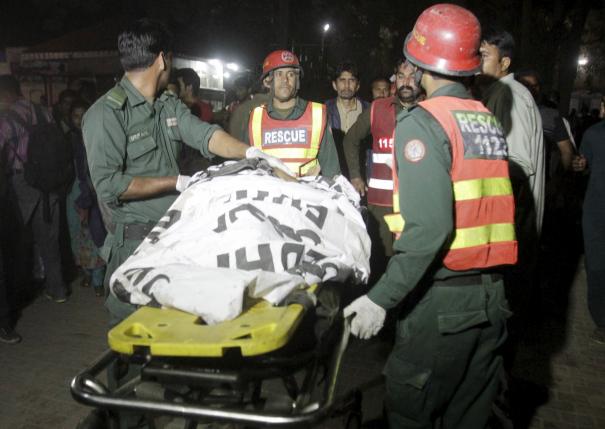
Rescue workers move a body from the site of a blast outside a public park in Lahore, Pakistan, March 27, 2016. REUTERS/Mohsin Raza
Pakistani authorities on Monday chased members of a Taliban faction which once declared loyalty to ISIS after the group claimed responsibility for a devastating Easter suicide bomb targeting Christian picnicking families that killed at least 70 people and wounded 340.
The death toll in the attack on Sunday evening in a busy park in the eastern city of Lahore rose to 72, killing mostly women and children enjoying an Easter weekend outing, local media reports said Monday.
Rescue services spokeswoman Deeba Shahnaz said at least 29 children, seven women and 34 men were killed and about 340 were wounded, with 25 in serious condition, when the suicide bomber struck in the busy park. Pakistan is a majority-Muslim state but has a Christian population of more than two million.
Pakistani authorities vowed to hunt down the militant bombers who claimed they specifically targeted Christians on Easter Sunday.
Security forces Monday arrested a “number of terrorist suspects and facilitators” in at least five raids in cities across Punjab province, where Lahore is located, according to an army spokesman. The spokesman, Gen. Asim Bajwa, said “a huge cache of arms and ammunition” was recovered in the operations, but did not say where the weapons stockpile was found.
The brutality of Sunday’s attack by Jamaat-ur-Ahrar, the group’s fifth bombing since December, reveals the movement’s efforts to raise its profile among Pakistan’s increasingly fractured militants.
It was Pakistan’s deadliest attack since the December 2014 massacre of 134 school children at a military-run academy in the city of Peshawar that prompted a big government crackdown on militancy.
Military spokesman Gen. Asim Bajwa said intelligence agencies, the army and paramilitary Rangers had launched several raids around Punjab following the attack.
“Number of suspect terrorists and facilitators arrested and huge cache of arms and ammunition recovered,” he said in a tweet that gave no detail. He could not be reached for further comment.
Pakistani Prime Minister Nawaz Sharif travelled to Lahore, one of his political strongholds, to visit the wounded in one of the city’s many hospitals, the premier’s office said. Prime Minister promised to bring justice.
“Our resolve as a nation and as a government is getting stronger and (the) coward enemy is trying for soft targets,” Sharif said, according to a statement from his office, calling for stronger intelligence coordination.
“Our goal is not only to eliminate terror infrastructure but also the extremist mindset, which is a threat to our way of life,” the prime minister said from Lahore, according to a statement from his office. “We must take this war to the doors of [these] terrorist groups,” he said. “God willing, we will wipe out them out.”
Jamaat-ur-Ahrar claimed responsibility for the attack late on Sunday night and issued a direct challenge to the government.
“The target was Christians,” a faction spokesman, Ehsanullah Ehsan, said. “We want to send this message to Prime Minister Nawaz Sharif that we have entered Lahore.”
Lahore is the capital of Pakistan’s richest province, Punjab, and is seen as the country’s political and cultural heartland.
Markets, schools and courts in Lahore were closed on Monday as the city mourned.
Jamaat-ur-Ahrar has claimed responsibility for several big attacks since it split from the main Pakistani Taliban in 2014.
While it mostly focuses attacks in its base of the northwestern Mohmand tribal area, it has previously carried out at least two major attacks in Lahore: one in 2015 that targeted two Christian churches and another at the Wagah border between India and Pakistan in late 2014.
Pakistan has been plagued by militant violence for the last 15 years, since it joined a U.S.-led campaign against militancy after the Sept. 11, 2001, al Qaeda attacks on the United States.
While the army, police, government and Western interests have been the prime targets of the Pakistani Taliban and their allies, Christians and other religious minorities have also been attacked.
